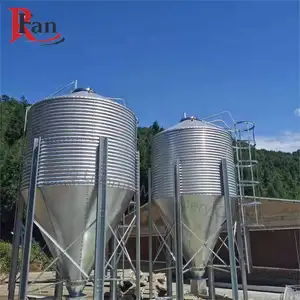
All categories
Featured selections
Trade Assurance
Buyer Central
Help Center
Get the app
Become a supplier

(951 products available)



























Market Overview: The global grain silos and storage system market, which includes palm kernel silos, experienced growth from USD 1.56 billion in 2023 to USD 1.65 billion in 2024. This sector is projected to continue its upward trajectory, with an expected compound annual growth rate (CAGR) of 5.48%, reaching USD 2.27 billion by 2030, according to 360iResearch™. The demand for efficient storage solutions is driven by the increasing production of palm oil, particularly in leading markets like Indonesia and Malaysia, which together account for over 85% of global palm oil supply. As palm oil production surged to 47 million metric tons in the 2023/2024 season, the need for specialized storage systems like palm kernel silos has become critical for managing this growing commodity effectively.
Industry Insights: The palm kernel silo market is influenced by several key factors, including rising consumer demand for palm oil and increasing sustainability measures among producers. The shift towards certified sustainable palm oil production is noteworthy, as only 20% of palm oil in Indonesia was certified as sustainable by 2022. This trend is likely to push agricultural stakeholders to invest in more efficient storage solutions that align with sustainable practices. Industry players are also responding to consumer behavior shifts, focusing on enhancing storage capacity and technology. As the market diversifies, understanding consumer preferences and pain points—such as the need for environmentally friendly storage options—will be essential for stakeholders looking to strengthen their market position.
Because of the expanded use of palm oil and its byproducts in different end-use industries, there is an enormous demand for storing the crude palm oil (CPO) and palm kernel (PK) products. There are numerous types of palm kernel silos, which can be categorized based on their design, construction material, functionality, or storage technology.
Modern palm kernel silos also have some kinds of technology integration.
Those are some unique kinds of palm kernel silos. Besides those, palm kernel storage systems, like the Palm oil tanks, that focus on preventing the quality loss of the stored materials have also become quite popular. The choice of the right kind of palm kernel silo will depend on specific storage requirements and preferences.
Maintenance is essential to keep the palm kernel storage silos in good condition for many years. Some regular maintenance practices are as follows:
The palm kernel silos have many usage scenarios and applications in palm kernel storage, processing, and supply chain management.
Except for the above usage scenarios, palm kernel silos are also widely used in the animal husbandry industry, biodiesel production industry, and palm kernel cake trading business.
Purchasing a palm kernel silo for sale requires careful analysis and attention to detail. Buyers need to examine the materials used to construct palm kernel silos. Usually, palm kernel silos are made with steel, which has a long lifespan. Steel also provides good protection from pests and fungi. Some steel palm kernel silos are coated with epoxy or powder coating, which provides an extra layer of protection against corrosion and abrasion.
Many palm kernel silos come with level display systems that show the current kernel stock levels on the silo. This display system can be integrated with other feed management systems to provide a complete overview of silo stock levels, thereby improving silo management. The combination of pressure, temperature, and moisture sensors provides insight into the quality of the stored palm kernels. These data can be recorded, analyzed, and retrieved, helping customers make informed decisions about the management of palm kernel products.
Buyers also need to consider the type of palm kernel silo they want. Horizontal palm kernel silos are suitable for large capacity storage and easy access for loading and unloading. Vertical palm kernel silos, on the other hand, occupy smaller floor areas due to their vertical configuration. They are suitable for businesses that have limited space. Cone-shaped palm kernel silos are designed for materials that are prone to segregation and arching. The cone-shaped apex creates a natural flow pattern for the material, thus reducing the retention time within the silo.
Customers prefer palm kernel silos that are easy to clean and maintain. Check the manufacturer's cleaning instructions and maintenance guidelines to find out the cleaning and maintenance procedures. To avoid extra expenses, it is important to consider the required capacity. Analyze the current storage capacity of palm kernels. Buy silos with the same capacity as the current or anticipated demand.
Q1: What are the trends in palm kernel silos?
A1: The palm kernel silo industry is rapidly changing. Key trends include the shift toward biodegradable materials for silos, greater automation and digitalization in silo management and monitoring, and the rising demand for palm kernel silos in emerging economies due to industrialization and urbanization.
Q2: What are the key benefits of using palm kernel silos?
A2: The palm kernel bin has many benefits. It provides great storage capacity for bulky and loose materials. Palm kernel silos can also be stacked and are easily transported, making them suitable for different logistical situations. Additionally, the palm kernel steel silo is strong and lasting, which can reduce replacement and maintenance expenses.
Q3: What materials are palm kernel silos made of?
A3: The palm kernel silos are made of various materials according to different types and applications, including carbon steel, galvanized steel, stainless steel, cement, and so on.